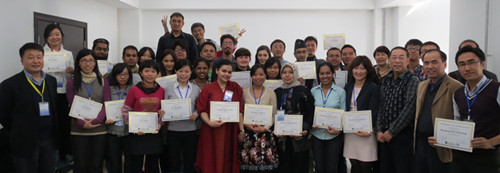Rapid climate change is one of the greatest environmental challenges facing the world today, and has become a major policy issue at national, regional, and global scales. In the past two decades, most Asian countries have experienced major growth in industrial and agricultural production, along with fundamental changes in lifestyle and consumption patterns. While Asian countries produce more and higher quality products for world markets, more people than any other continent have walked out of shadow of poverty. However, environmental change and deterioration are also highly evident as Asia regional economy continued to grow at a high rate. Under combined pressure of climatic change and intense human use of natural resources, the natural environment in Asia has steadily degraded. Meanwhile, share of Asian developing countries to global GHG emissions is rising rapidly. Impacts of climate change are especially visible in Asia on various sectors including agriculture, forestry, biodiversity conservation, water resources, human health, air quality, energy security, etc. Impacts of climate change in Asia are already serious, and will very likely further worsen in future. Environmental sustainability is under serious threat. This compromises the future development and the livelihood of Asia’s 3.8 billion residents.
Meeting those science challenges requires understanding of the physical science basis of climate change, consideration of its impacts on all spheres of human activity, and development of policy strategies and actions.
The 2012 CAS-START training on regional climate change provide climate change researchers and practitioners from Asia countries with advanced knowledge and skills in this fast-moving field, and to enhance the environmental capacity building for the regional sustainable development. The training course is sponsored by CAS (www.cas.cn) and START (start.org), and organized by START Regional Center for East Asia (TEA). It addresses various scientific aspects of regional climate change, including multi-platform observation, trends and impacts analysis, and climate modeling. The curriculum comprises lectures, seminars, along with site visits and excursions in CAS research facilities and field stations.
Participants are expected to systematically learn scientific principles and methods on regional climate change and sustainability. After the completion of this course they should be able to gain capacity for actively contributing to the process of adaptation and mitigation to climate change in their respective countries and regions.
The training opened with a short introduction by Prof. JIA Gensuo, the director of START Regional Center for East Asia. He emphasized that the training is designed to provide young researchers with advanced knowledge and skills, and that trainees are here not to learn science facts, but to learn skills, learn how to perform research and outreach by themself. Academician FU Congbin of CAS and senior officers from China Ministry of Environmental Protection (Dr. SUN Xuefeng), CAS University (Prof. WANG Yanfen), CAS Institute of Atmospheric Physics (Prof. CHEN Hongbin), and United Nations Environment Programme (Dr. Nanqing Jiang) attended and addressed at the opening ceremony.
The training courses were organized in four major themes: regional climate change theory and data analysis, field and satellite observation technologies, land surface and climate modeling, and impacts, adaptation, and mitigation (see Appendix I). Trainees were also given opportunity to practice numerical simulation with land surface model (CLM) and regional climate model (RegCM and RIEMS) in two practice sessions.
Four site visits and excursions were organized at CMA Daxing Climate Research Station, the Capital Museum, CAS Satellite Facilities, and the National Science & Technology Museum, respectively, where trainees were demonstrated with climate observation platforms and equipment, low carbon showcase, and local culture.
Participant presentation and discussion were organized in last two days. Each participant gave a 15-min presentation, and followed by very active discussion (see Appendix II). This session was proved to be an excellent platform for participants to learn and communicate with each other, as well as with TEA scientists and students.
The 18-day training was summarized with the graduate ceremony. After successfully completed all the training sessions, trainees were granted with certificates issued jointly by CAS IAP and START. Instructors and trainees were aware of the importance of continuing communication, and decided to keep in close touch through mailing list, short visit, joint project, and postgraduate study at CAS.
This course is especially designed to meet the professional demand of Asian young scholars working in climate change sciences with special focus on regional climate change observation, analysis, and modeling. A corresponding professional background in atmospheric sciences or earth sciences at M.S. or higher level is a prerequisite.

